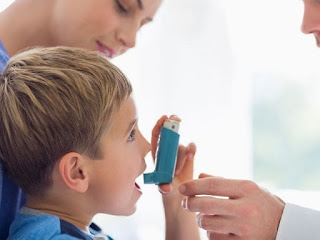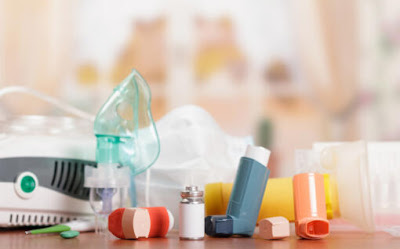Causes
The exact cause of asthma is not known. Researchers think it is partially passed down through families. But it can also be caused by many other things such as the environment, infections, and chemicals.
Risk Factors
A child is more likely to get asthma if he or she:
- Is age 5 to 17 years old
- Has family members with asthma
- Has allergies
- Is around tobacco smoke
- Is around air pollution
- Has another health problem such as sinus problems and being overweight
Symptoms
Symptoms can occur a bit differently in each child. Children with asthma have times when they have few, if any symptoms. They also have times when symptoms flare up. Symptoms may include:
- Cough that is either constant or comes and goes
- Wheezing or whistling sound that is heard while your child is breathing
- Trouble breathing or shortness of breath while your child is active
- Chest tightness
- Tiredness
- Cough at night
- Noisy breathing
- The symptoms of asthma can be like other health conditions. Make sure your child sees his or her healthcare provider for a diagnosis.
Pic:Asthma Society. ie
Diagnosis
To diagnose asthma, your child’s healthcare provider may recommend these tests:
Spirometry. A spirometer is a device used to check lung function. It can be done in young children, including infants.
Peak flow monitoring. A peak flow meter is used to measure the amount of air a child can blow out of the lungs. This measurement is very important in checking how well your child’s asthma is being controlled.
Chest X-rays. This diagnostic test uses invisible energy beams to make images of internal tissues, bones, and organs on film.
Allergy tests. Allergy tests can show if your child has allergies that may be causing or worsening asthma.
Treatment
Treatment will depend on your child’s symptoms, age, and general health. It will also depend on how severe the condition is.
- Your child’s healthcare provider may refer you to a pulmonologist.
- This is a doctor with special training to treat lung conditions.
- Your child may also be referred to an asthma and allergy specialist.
- Your child’s treatment is based on how severe his or her symptoms are and how easily they are controlled.
- Treatment includes finding triggers and ways to avoid them. It will also include medicines.
Asthma medicines include:
Bronchodilators. These medicines are used to help open the narrowed airways. They may relieve coughing, wheezing, shortness of breath, or difficulty breathing.
Anti-inflammatory medicines. These medicines help decrease the inflammation in the airways.
Anti-leukotrienes. These medicines help decrease the narrowing of the airways. These are usually given by mouth.
Immunotherapy. This can be used for severe asthma attacks in children ages 12 and older.
Complications
Asthma that is not well controlled may cause:
- Severe asthma attacks
- Lasting damage to the airways
- Increased time in the hospital or the emergency department
- Missed school or other activities
- Prevention
- Asthma can’t be completely prevented.
There are steps you can take to reduce the chance of your child developing asthma. They include:
- Avoiding secondhand smoke
- Avoiding air pollution
In most children, asthma flare-ups can be prevented by:
- Avoiding known triggers
- Carefully managing symptoms
- Taking medicines as instructed
- Living with
- You can help manage your child’s asthma by:
- Finding out your child’s triggers and keeping him or her away from them.
- Giving your child medicine as directed to prevent symptoms.
- Creating and keeping an Asthma Action Plan.
- Closely watching asthma signs and symptoms to know when they are getting worse.
- Knowing what to do when asthma gets worse.
- Work with your child’s healthcare provider to find the best way to take care of your child’s asthma. There are guidelines for children from newborn to age 4, ages 5 to 11, and ages 12 and older.
The more information a person with asthma has, the better the asthma can be controlled.
When to Call a Healthcare Provider???
Call your child’s healthcare provider if your child’s symptoms are not well-controlled.
For example, your child is waking at night with symptoms or is having trouble with daily activities.
Call your child’s healthcare provider or get medical help right away if your child has severe
symptoms.
These severe symptoms can include trouble:
Breathing
Sleeping
Walking
Talking
Key Points:
- Asthma is a long-term (chronic) lung disease that causes the airways to swell and make more mucus, and the muscles around the airways to tighten.
- Asthma symptoms include trouble breathing, wheezing, chest tightness, and coughing.
- Staying away from those things that cause asthma symptoms (triggers) is an important part of asthma treatment.
- Medicines are used to prevent and control symptoms during flare-ups.
- Asthma can cause serious complications if it is not well-controlled.
Pic: standardmedia
Next Steps
Tips to help you get the most from a visit to your child’s healthcare provider:
1. Know the reason for the visit and what you want to happen.
2. Before your visit, write down questions you want answered.
3. At the visit, write down the name of a new diagnosis, and any new medicines, treatments, or tests.
4. Also write down any new instructions your provider gives you for your child.
5. Know why a new medicine or treatment is prescribed and how it will help your child. Also know what the side effects are.
6. Ask if your child’s condition can be treated in other ways.
7. Know why a test or procedure is recommended and what the results could mean.
8. Know what to expect if your child does not take the medicine or have the test or procedure.
9. If your child has a follow-up appointment, write down the date, time, and purpose for that visit.
10. Know how you can contact your child’s provider after office hours. This is important if your child becomes ill and you have questions or need advice.






